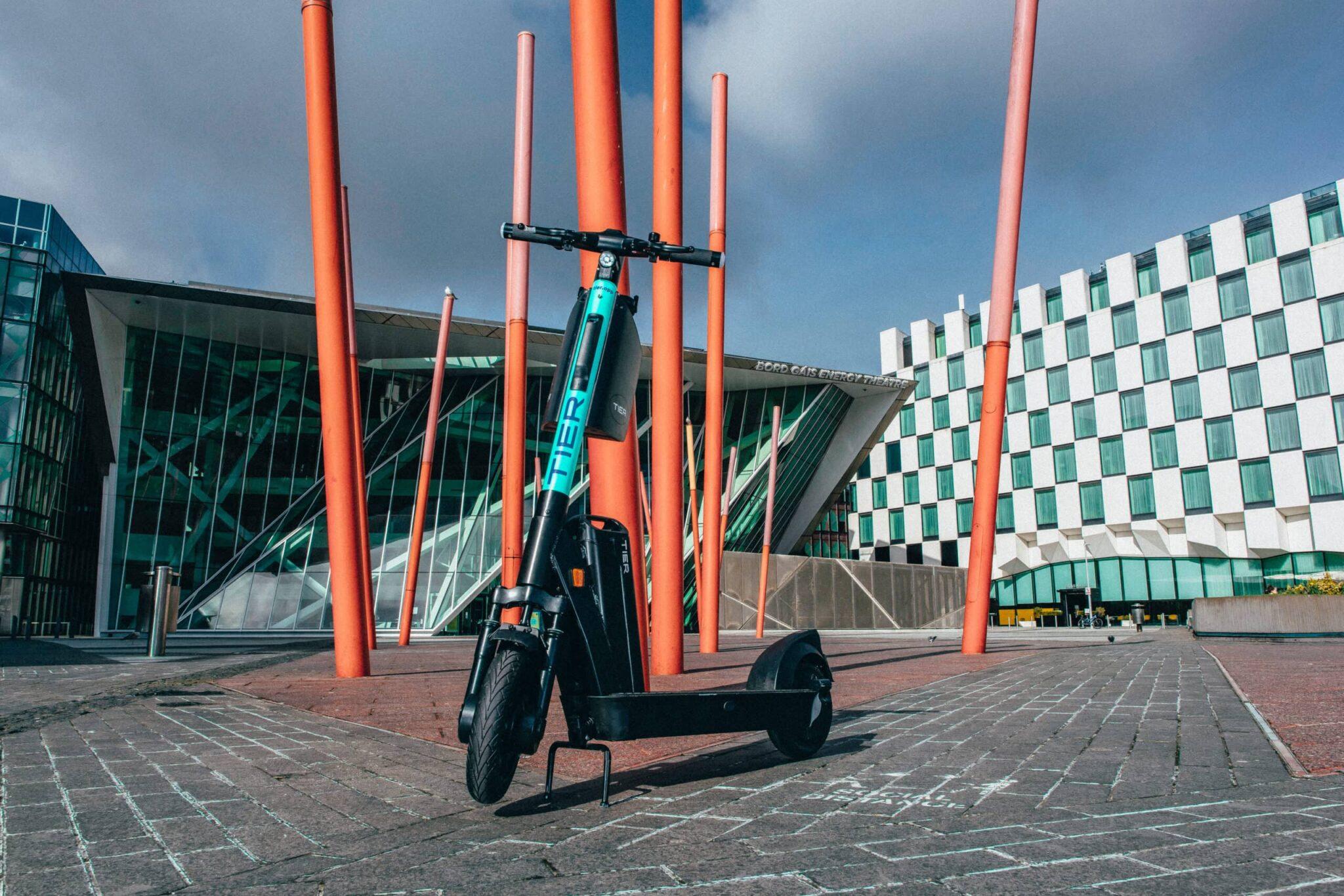Dublin to host innovative e-scooter AI research pilot project
April 15, 2021

Luna, TIER, DCU and the Insight SFI Research Centre for Data Analytics, to collaborate on world's first academic-industry computer vision research partnership
- A world-first fleet of Artificial Intelligence/Computer Vision equipped e-scooters, will be deployed for use by Dublin City University (DCU) staff and campus companies, in a research pilot project, within and between the various DCU campuses across Dublin.
- Insight researchers will work alongside Luna, TIER and the Smart DCU team, to monitor how AI and computer vision can improve safety for e-scooter riders and pedestrians.
- TIER E-scooters will be equipped with Luna’s Computer Vision technology for the purposes of pedestrian avoidance and lane detection, with the vision data gathered from trips being analysed and used by researchers to develop new ‘smart city’ use cases and applications for Luna’s AI models and algorithms.
- DCU and TIER will also assess how e-scooters can replace other modes of transport across the University community of 18,000 students and almost 2,000 staff.
- The project will involve all scooter trips beginning and ending on the various DCU campuses, and will run for a period of six months.
Dublin, April 15, 2021 – A new AI-powered e-scooter research pilot project is to launch in Dublin City University (DCU), in parallel with moves to make scooters street legal across Ireland. The shared scooter pilot scheme, which will operate on DCU campuses (and between campuses once legislation allows), aims to set the bar for e-scooter safety standards in Ireland and worldwide. The trial will involve the collaboration of four organisations: Europe’s largest e-scooter operator TIER; Irish micromobility tech platform Luna; the Insight SFI Research Centre For Data Analytics; and Smart DCU (a district of Smart Dublin).
As well as being a world first academic-industry research project focused on computer vision in scooters, the pilot will also be Ireland's first major structured e-scooter trial. The purpose of the research project is to simultaneously improve e-scooter safety and to explore the Smart City possibilities associated with computer vision equipped micromobility vehicles.
The collaboration will start immediately on individual DCU campuses, while the computer vision equipped TIER scooters will also be able to operate between the various campuses (and potentially other private sites across Dublin) as soon as Government legislation regulating electric scooter usage is signed into law.
As part of the project, TIER and Luna will provide a fleet of 30 computer vision-enabled scooters, allowing DCU-based Insight researchers to explore a rich new source of smart city data. Equipped with the Luna technology, the TIER scooters will be immediately capable of running pedestrian detection and lane segmentation algorithms, allowing the vehicles to understand how many people are in their path, as well as whether they are on the road, a cycle lane, or footpath.
The vision data generated by the fleet will be analysed by DCU-based Insight researchers, with a view to identifying smart city use cases and applications of value to local authorities, in line with the mission of Smart Dublin. It is envisaged that some of the use cases that could be prototyped during the pilot, include traffic congestion alerts, road condition monitoring, street infrastructure mapping, kerbside management applications, as well as heat mapping of footpath riding incidents as an indicator of problematic junctions or inadequate cycling infrastructure.
Separately TIER and DCU will monitor the modal shift pattern from cars to scooters across DCU users, with a focus on reducing the University’s transport-related emissions. TIER will also explore the impact of its ‘Energy Network’ innovation in terms of driving footfall to local retail outlets as part of cities post-Covid economic recovery. TIER’s unique model allows users to swap depleted e-scooter batteries - in return for free travel - at charging stations hosted in local retail outlets. Pilot data from the Energy Network in Finland reveals the average convenience store enjoys an average of €18,000 additional income as a result of TIER users entering to switch batteries.
As part of the pilot project, the collaborative research team will also look at other insights particularly around user behaviours and attitudes, which can feed into any commercial shared e-scooter schemes that may be launched in Dublin and elsewhere across Ireland in the future.
Fred Jones, TIER General Manager for Northern Europe said: “This is such an important research pilot project for TIER in Ireland and we look forward to mobilising the DCU fleet of e-scooters. This is an exciting opportunity for detailed research on smart city applications of scooters as well as modal shift, as we work with the University to reduce its carbon footprint and offer a more sustainable first and last mile public transport solution. We hope to apply all project learnings to future TIER operations in Ireland”.
Andrew Fleury, Co-Founder & CEO, Luna said: “This research project will help shape the future regarding the safety and municipal value of electric scooters, not just in Dublin and Ireland, but globally. The project will also enable the further development of Dublin as a ‘smart city’ and strengthen Luna’s position as a key technology provider in the governance and control of shared electric scooter schemes into the future.”
Prof. Noel O’Connor, CEO Insight SFI Research Centre for Data Analytics said: “The confluence of e-mobility, smart cities, computer vision, AI and data analytics is a key area of interest to Insight researchers in DCU. The ‘Smart DCU’ platform in partnership with Smart Dublin, has created the perfect test bed where industry and academia can combine to come up with the solutions that will help enhance the future of safe micromobility. This in turn will drive its adoption globally, supporting societies shared climate goals.”
Dr Declan Raftery, COO Dublin City University added: “This research is a great example of the calibre of groundbreaking innovations that are happening across DCU. Luna was founded in our Alpha Innovation Campus and we’re delighted to pilot the technology across our campuses. We are genuinely curious to understand how e-scooters can help drive modal shift across our community of 18,000 students and almost 2,000 staff, and we want to work with Dublin and Ireland stakeholders to disseminate all useful learnings from the pilot, as we prepare for a return to campus and a wider return to work in a post-Covid world.”
+++ENDS+++
About TIER Mobility
TIER Mobility is Europe's leading shared micro-mobility provider, with a mission to Change Mobility for Good. By providing people with a range of shared, light electric vehicles, from e-scooters to e-bikes and e-mopeds, powered by a proprietary Energy Network, TIER helps cities reduce their dependence on cars. Founded in 2018 by Lawrence Leuschner, Matthias Laug and Julian Blessin, TIER is headquartered in Berlin and currently operates in 150+ cities across 16 countries in Europe and the Middle East. With a focus on providing the safest, most equitable and most sustainable mobility solution, TIER has been climate neutral since 2020.
TIER’s investors include SoftBank Vision Fund 2, Mubadala Capital, Northzone, Goodwater Capital and White Star Capital. For more information, please visit tier.app.
ABOUT LUNA
Luna began as a collaborative innovation project in the Intel-Movidius ‘Edge AI’ accelerator programme in DCU Alpha in 2019. Luna, now a standalone company, provides computer vision and Edge AI solutions to better manage deployment and operation of shared micromobility fleets. Luna allows an e-scooter to understand if it is operating in a heavily pedestrianised area and how to react accordingly. It also equips e-scooters to detect the kind of surface or lane they are riding on (bike lane, footpath, road), and again react accordingly depending on an operator and/or the city’s safety parameters. Luna is also developing a series of algorithms and analytics tools that will allow scooter operators and Cities gain new insights into how the urban realm is performing, for both citizens and businesses. The company’s investors include former Irish and Lions rugby captain Brian O’Driscoll.
ABOUT INSIGHT SFI RESEARCH CENTRE FOR DATA ANALYTICS
The Insight SFI Research Centre for Data Analytics is one of Europe’s largest data analytics research organisations, with over 450 researchers, more than 220 industry partners and €150+ million in funding. Insight spans Smart Communities and IoT, Sustainability and Operations, Health and Human Performance, as well as Enterprise and Services. Insight is made up of four host institutions at Dublin City University, NUI Galway, University College Cork and University College Dublin. Its partner sites include Maynooth University, Trinity College Dublin, Tyndall National Institute, and the University of Limerick.
ABOUT SMART DCU
Smart DCU is a collaborative test bed initiative between Dublin City Council and partners Enable, Insight and DCU Alpha. The goal of Smart DCU is to develop, test and trial cutting-edge technology innovations emerging from industry partners based in DCU Alpha and elsewhere, through leveraging the IoT and Data Analytics capabilities of Enable and Insight respectively. Smart DCU is a District of the wider Smart Dublin initiative, founded by the four Dublin Local Authorities, which brings together technology providers, academia and citizens to build a better, more resilient Dublin.
Media Contact

Press department
TIER Mobility